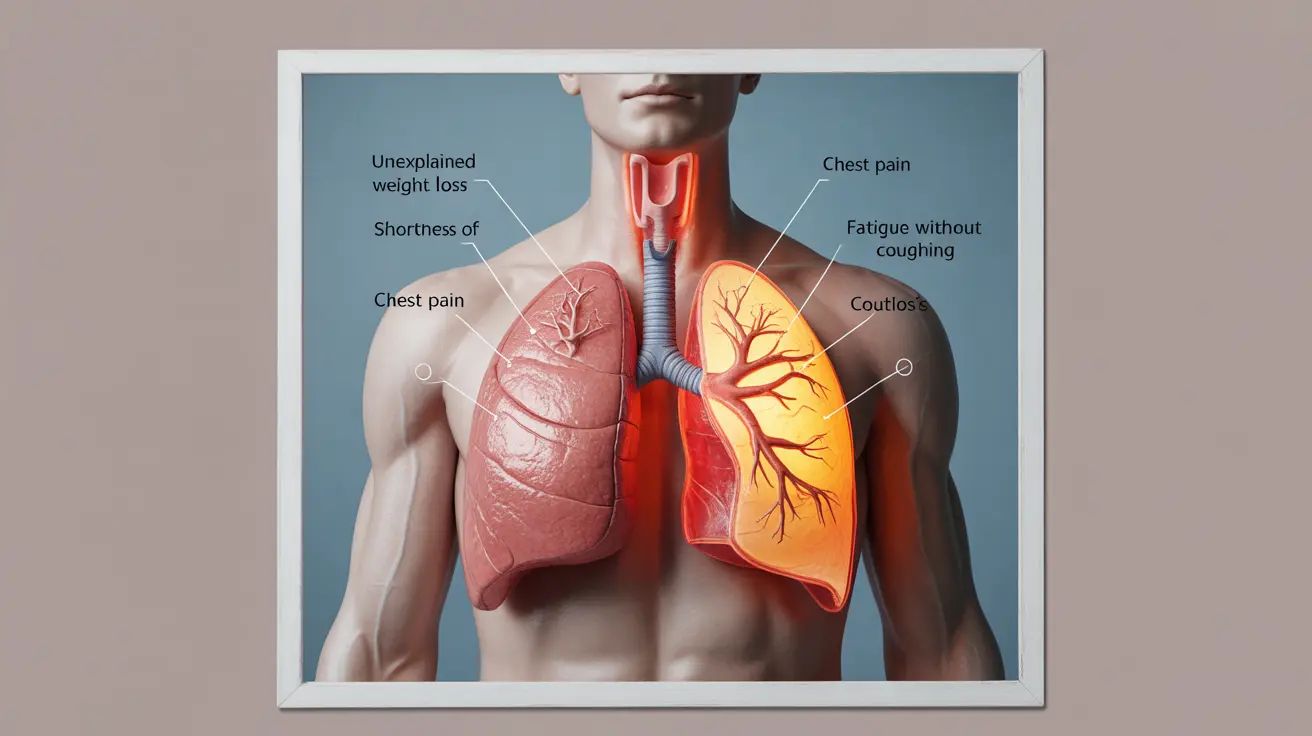Many people associate lung cancer with a persistent cough, but this serious condition doesn't always present with this well-known symptom. Understanding that lung cancer can develop silently, without causing a cough, is crucial for early detection and improved treatment outcomes.
This comprehensive guide explores the various ways lung cancer can manifest without a cough, other important warning signs to watch for, and when to seek medical attention.
Early Signs of Lung Cancer Without Coughing
While a persistent cough is a common symptom of lung cancer, the disease can present with various other indicators that shouldn't be overlooked:
- Unexplained weight loss
- Shortness of breath during normal activities
- Chest pain unrelated to coughing
- Recurring respiratory infections
- Fatigue and weakness
- Loss of appetite
Silent Symptoms That Shouldn't Be Ignored
Breathing Changes
Many patients first notice subtle changes in their breathing patterns, such as becoming winded more easily during routine activities or experiencing breathlessness while lying flat. These symptoms can develop gradually and may be mistakenly attributed to aging or decreased fitness.
Pain Signals
Lung cancer can cause different types of pain, including:
- Deep chest pain
- Shoulder or upper back discomfort
- Pain that worsens with deep breathing
- Bone pain in advanced stages
Systemic Symptoms
Some people experience general health changes that seem unrelated to the lungs:
- Unexplained fatigue
- Night sweats
- Fever without infection
- Muscle weakness
- Unexplained weight loss
Risk Factors and Early Detection
Understanding your risk factors is crucial for early detection, especially when obvious symptoms like coughing are absent. Key risk factors include:
- Smoking history
- Exposure to secondhand smoke
- Family history of lung cancer
- Exposure to radon or other environmental toxins
- Occupational exposure to carcinogens
When to Seek Medical Evaluation
It's important to consult a healthcare provider if you experience:
- Persistent shortness of breath
- Unexplained weight loss
- Recurring chest infections
- Chronic fatigue
- Any concerning symptoms lasting more than two weeks
Frequently Asked Questions
Can lung cancer develop without causing a cough?
Yes, lung cancer can develop and progress without causing a cough. While coughing is a common symptom, some patients may experience other symptoms first or have no obvious symptoms in the early stages.
What are the signs of lung cancer if I don't have a persistent cough?
Common signs include unexplained shortness of breath, chest pain, fatigue, weight loss, recurring respiratory infections, and changes in breathing patterns during normal activities.
How can lung cancer be detected early when there is no cough?
Early detection can be achieved through regular screening for high-risk individuals, paying attention to other symptoms, and discussing any concerning health changes with your healthcare provider. Imaging tests like low-dose CT scans can detect lung cancer before symptoms appear.
What other symptoms should prompt me to see a doctor for possible lung cancer besides coughing?
You should consult a doctor if you experience unexplained weight loss, persistent shortness of breath, chest pain, recurring respiratory infections, chronic fatigue, or any unusual symptoms that last more than two weeks.
Who should get screened for lung cancer if they don't have a cough or obvious symptoms?
Screening is recommended for individuals aged 50-80 with a significant smoking history (20 pack-years or more), current smokers, or those who have quit within the past 15 years. People with other risk factors, such as family history or occupational exposure to carcinogens, should discuss screening options with their healthcare provider.




